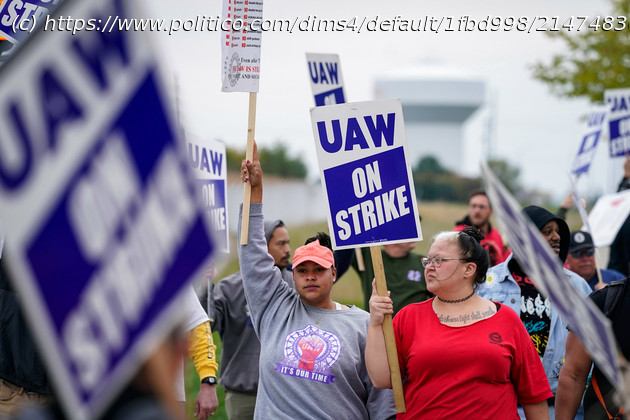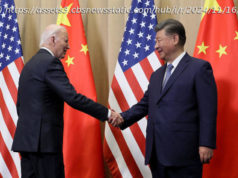A United Auto Workers strike against the big U.S. automakers would pose tangible and political problems for the president’s push for electric vehicles.
President Joe Biden’s pledge to make electric vehicles the center of his clean energy economy is hitting a roadblock: one of his party’s most powerful allies in the labor movement.
The United Auto Workers’ criticisms of Biden’s handling of his electric car and truck subsidies have become a frequent theme for the 150,000-member union as it prepares for a possible strike against the major U.S. automakers this week. That means a key part of the president’s trillion-dollar-plus climate and infrastructure agenda, a centerpiece of his argument for reelection, faces friction with a major source of Democratic political muscle in states like Michigan.
Labor supporters say the roots of the conflict date back decades, to Democratic presidents who pursued pro-business or free-trade policies that the union blames for hollowing out protections for American workers. Now Biden is facing the blowback from that era, even as he pursues energy policies that he pledges will reverse that tide and rebuild U.S. manufacturing jobs.
“UAW members feel abandoned by the Democratic Party,” former UAW President Bob King said in an interview, citing President Bill Clinton’s signing of the North American Free Trade Agreement and the failure of Biden’s Inflation Reduction Act to ensure that clean energy funds flow to union workers. “I think there’s a segment of the Democratic Party that sees itself as serving corporations rather than the common good. … We’ve had a lot of disappointments.”
Biden has touted the climate incentives in last year’s Inflation Reduction Act and his 2021 infrastructure law as critical to driving a U.S. manufacturing revival. Those laws have already drawn more than $200 billion in new investments from the private sector for plants to make clean energy products such as electric vehicle batteries and solar panels, aimed at reducing U.S. dependence on fossil fuels.
But those clean energy investments are mostly flowing to Republican-led states and congressional districts, including in states with low levels of union membership and laws that make labor organizing difficult. The UAW could also see a long-term erosion of members from the switch to electric vehicles, which generally have fewer parts than gasoline-powered models — especially if workers making the EVs’ crucial batteries aren’t covered by the same protections as traditional autoworkers.
UAW President Shawn Fain has demanded that the Biden administration ensure that union members share in the transition to electric cars and trucks. In an interview with CNN on Monday, Fain reiterated that the union is waiting for the administration’s response before it endorses Biden’s reelection — something Fain has so far refused to do.
“Actions are going to dictate endorsements, so we’ll see how things continue to play out, and we have a lot of issues to resolve,” he said. “There’s a lot with the EV transition that has to happen, and there’s hundreds of billions of our taxpayer dollars that are helping fund this, and workers cannot continue to be left behind in that equation.”
Biden agrees that workers must share in the benefits, senior White House adviser Gene Sperling told POLITICO, adding that the president “was always laser focused on ensuring that the transition to an electric vehicle future was one that promoted union jobs and ensured that those impacted by new technologies had the first shot at new jobs at comparable wages at a retooled factory in their own community.






